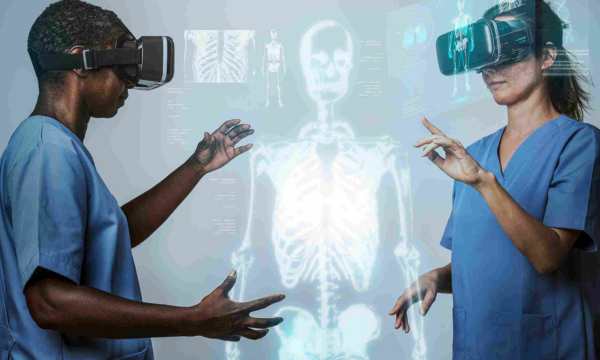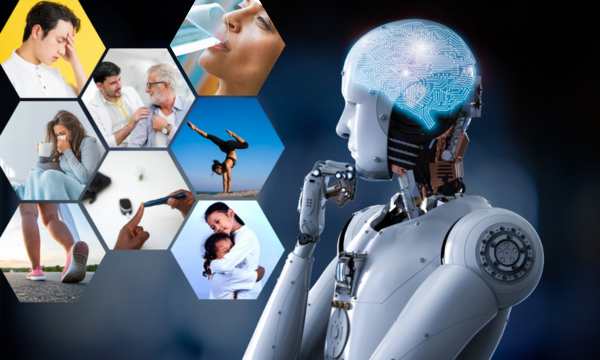Healthcare is about to undergo a massive technological transformation, and artificial intelligence (AI) will be at the center of this transformation.
Ad
Now that we’re in 2025, several AI health trends are starting to show promise in making it more efficient, accessible, and better suited to everyone’s needs.
These trends are not only changing the way healthcare professionals work but also the way patients experience their care.
Here are seven AI health trends that will significantly change the field by 2025.
1. Predictive analytics in healthcare
One of the most exciting applications of artificial intelligence in healthcare is predictive analytics, which looks at past data to guess what will happen in the future.
By 2025, these tools will become even smarter and can now identify disease outbreaks, hospitalizations, and potential health crises before they occur.
With this kind of foresight, healthcare professionals can make better use of their resources and intervene before problems arise, resulting in better patient outcomes and lower costs.
2. AI improves medical imaging
Artificial intelligence is becoming increasingly important in medical imaging. Algorithms can now view X-rays, MRIs, and CT scans more accurately than ever before.
These AI systems can notice strange things that the human eye might miss. This helps doctors detect diseases such as cancer and heart disease early.
This trend not only makes diagnosis more accurate but also speeds it up, making healthcare more accessible.
3. Health assistants and chatbots working online
Virtual health assistants, powered by artificial intelligence, are quickly becoming an important part of healthcare. These chatbots assist patients 24 hours a day, 7 days a week. They answer questions, make appointments and even provide simple medical advice.
By 2025, they will become more personalized, able to track patients’ health data, and make personalized health recommendations, resulting in a better overall patient experience.
4. Application of AI in drug discovery and development
Artificial intelligence is dramatically speeding up the process of finding and developing new drugs, to the point where potential drug candidates are being discovered at a pace that would have been unthinkable just a few years ago.
AI algorithms can look at large amounts of data to guess how different chemicals will react in the human body. This helps them find candidates suitable for further testing.
These changes not only speed up the production process of new medicines but also save money.
5. AI will make medical care more personal
The most advanced application of artificial intelligence in healthcare is personalized medicine, where computers use genetic data to provide unique treatment to each patient.
This approach is particularly effective in treating difficult diseases such as cancer because AI can help find the best treatment options for each patient by looking at their unique genetic makeup.
Personalized medicine will become even more popular in 2025, increasing hopes for better solutions with fewer side effects.
6. AI-powered wearables and sensors
Wearable health technology is getting better and better. Artificial intelligence devices can now monitor vital signs, detect falls, and even predict potential health problems before they worsen.
These wearable devices are becoming smarter and can now provide people with real-time health information and alerts, encouraging them to live healthy lives and consult a doctor when necessary.
Thanks to this major shift towards preventative healthcare, people can now take control of their health.
7. Robotic Process Automation in Healthcare Management
The use of artificial intelligence in robotic process automation (RPA) makes everyday tasks in healthcare more efficient. These tasks include patient scheduling, billing, compliance monitoring, and data entry.
By 2025, RPA will take over some administrative tasks, making it easier for healthcare workers to focus on caring for patients. This trend not only makes everything run more smoothly but also makes medical data more accurate and secure.

AI Health Trends (Source- Google)
Conclusion
Looking ahead to 2025, these seven AI health trends will transform healthcare. Artificial intelligence is paving the way for a more efficient, patient-centered healthcare system by making diagnosis more accurate, treatment plans more personalized, and streamlining daily tasks.
As these technologies continue to develop, AI has enormous potential to make healthcare better and more accessible.
FAQs
1. Will AI medical imaging tools replace radiologists?
No, medical imaging tools that use artificial intelligence will not replace doctors. Instead, they make the job easier. These tools can help radiologists make more accurate diagnoses, spot problems that others may miss, and speed up the examination process.
Radiologists remain critical in figuring out the meaning of AI results, making clinical decisions, and providing personalized care for each patient.
2. What types of tasks can chatbots and virtual health assistants do?
Virtual health assistants and chatbots can do many things, such as answer patient questions, make appointments, give patients simple medical advice, and remind them to take their medications.
Advanced chatbots can also focus on patients’ health data and provide them with personalized health advice based on each person’s description of their health.
3. How does artificial intelligence accelerate the discovery and production process of new medicines?
Artificial intelligence (AI) speeds up the process of finding new drugs by sifting through large amounts of documents faster than traditional methods.
AI programs can guess how well compounds work and how safe they are, speeding up the process of selecting compounds for clinical trials and helping scientists figure out how diseases work at a biological level.
This makes the process of creating new drugs faster, cheaper, and more successful.
4. What does personalized treatment mean? How can artificial intelligence help?
Personalized medicine means ensuring that each patient’s medical care is based on their unique characteristics, such as their genes, lifestyle, and environment.
Artificial intelligence (AI) is helping to personalize medicine by looking at genetic and other health data to find the best way to treat each patient.
This approach is particularly effective in treating complex diseases such as cancer because AI can help find the best way to treat each patient based on their unique genetic makeup.
5. How can artificial intelligence devices help preventative healthcare?
Wearable devices, powered by artificial intelligence, aid preventative healthcare by continuously monitoring vital signs, activity levels, and other health indicators.
These gadgets can detect early signs of health problems, provide users with real-time feedback and alerts, and motivate them to maintain healthy habits.
Wearable devices powered by artificial intelligence are important for preventing disease and improving overall health because they can provide people with personalized health insights.
6. What is RPA (Robotic Process Automation) and how does it play a role in healthcare?
RPA is the use of artificial intelligence-powered robots or software to automate routine administrative tasks in healthcare.
These duties include patient scheduling, billing, ensuring compliance, and data entry. RPA makes business operations more efficient, reduces the chance of errors, and ensures that healthcare providers can concentrate more on patient care.
This technology is important for streamlining back-end tasks and ensuring medical data is accurate and secure.


